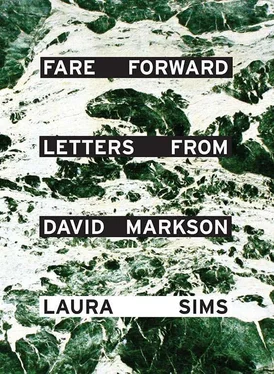TLN,
28)
Nobody comes. Nobody calls. (
TLN,
56)
Nobody comes. Nobody calls—
Which Novelist after a moment realizes may sound like a line of Beckett’s, but is actually something he himself has said in an earlier book. (
TLN,
58)
For those who have not paid close enough attention. Kate of Wittgenstein’s Mistress comes to a poignant realization one day:
…one curious thing that might sooner or later cross the woman’s mind would be that she had paradoxically been practically as alone before all of this had happened as she was now, incidentally.
…
One manner of being alone simply being different from another manner of being alone, being all that she would finally decide this came down to, as well.
Which is to say that even when one’s telephone still does function one can be as alone as when it does not. (
WM,
231)
As if predicting the narrators of Markson’s future, pacing about in their populated worlds, waiting for the phone to ring.
*
But in another sense, Markson’s narrators are not alone:
Rilke wrote standing up.
Lewis Carroll wrote standing up.
Thomas Wolfe wrote standing up.
Robert Lowell and Truman Capote wrote lying down.
Writer sits. (
TINN,
81)
Voila: a community on the page, one that defies both space and time. Furthermore, Markson, in conjuring this unorthodox community, also creates a great monument to art itself, and to the art-makers who have sustained one another (by criticizing, praising, studying, quoting, and copying one another) through time.
If we consider the books as monuments, then, it justifies Writer’s suggestion in This Is Not a Novel to call them “Book[s] of the Dead”—especially considering that death is a pervasive focus of the tetralogy.
Where are those who were in this world before us? Go to the cemetery and look at them.
Said Anon. in the twelfth century. (
VP,
183)
And, on opening any of the books randomly:
Camus died in a car crash.
…
Charmian and Iras committed suicide when Cleopatra did. (
RB,
64-5)
*
Wallace Stegner died after an automobile crash.
Bradley died of blood poisoning.
…
Pablo Neruda died of leukemia. (
TINN,
104-5)
*
Novalis’s
Heinrich von Ofterdingen.
The last one that Borges asked to hear before his death.
October 17, 1973, Ingeborg Bachmann died on. (
TLN,
170)
In absence of an overarching plot, these deaths are crucial events. In most novels, one may find a death or two at the end to neatly tie up a linear plot — but here we have a whole field of deaths on which to gaze, a whole regiment of “linear plots” tidily concluded. One might look at these lines as headstones in a cemetery, which is beautiful in its own right as a work of art, and which appears literally in Markson’s Reader’s Block, as part of the minimal (hypothetical) setting:
Protagonist living near a disused cemetery, perhaps? (
RB,
14)
Below, Reader of Reader’s Block considers the blankness of snow covering this cemetery:
With snow, the ranks of still white stone can assume an almost occult unreality. (
RB,
98)
Watching abstractedly among the ancient oaks as the entire cemetery commences to disappear. (
RB,
99)
The cemetery framed beyond the window in January light. The skull, lower left foreground, a redundant nearer memento mori. (
RB,
164)
The eschatology of the still white stones in snow. (
RB,
165)
What is instantly obvious is the moribund significance of this scene: this is Reader’s own end, the erasure of the world, the end of the human race, and of everything.
But Kate of Wittgenstein’s Mistress, who finds herself truly alone at the end of the world, describes an inherent possibility in the snow’s draping effect. Here she depicts the wintertime beach, covered in snow:
Here, when the snows come, the trees write a strange calligraphy against the whiteness. The sky itself is often white, and the dunes are hidden, and the beach is white down to the water’s edge, as well.
In a manner of speaking almost everything I am able to see, then, is like that nine-foot canvas of mine, with its opaque four white coats of gesso. (
WM,
37)
What begins as an obliteration of the world by snow, similar to that which takes place in Reader’s Block, ends with the image of a blank canvas, thus the possibility of new creation. In the next sentence, Kate “draws” on the blank space: “Now and again I build fires along the beach.” ( WM, 37)
She returns to this very description of the wintertime beach towards the end of the book; her attitude towards the scene, however, has changed:
Still, on the morning after [the snow] fell, the trees were writing a strange calligraphy against the whiteness.
For that matter the sky was white, too, and the dunes were hidden, and the beach was white all the way down to the water’s edge.
So that almost everything I was able to see, then, was like that old lost nine-foot canvas of mine, with its opaque four white coats of gesso.
Making it almost as if one could have newly painted the entire world one’s self, and in any manner one wished.
(WM,
233)
It’s doubtful that Kate will “paint the entire world [her]self, … in any manner [she] wished”; given her situation, her qualified language is understandable. “Almost as if” and “one could have” indicate her realistic ambivalence about her ability and desire to undertake the task. She has that in common with Reader; both of them lean closer to reading annihilation into the blanked-out landscape, and with good reason. In both characters’ cases, the futility of making any new mark on the world becomes overwhelming — why should Kate, as the last human on earth?
And why should Reader, at the end of his life, wholly alone, bother to leave something new behind?
Reader thinks about the end of the world, and about his protagonist courting his own end:
In the interim, what more for the elderly man in the house at the cemetery but to pause at his accustomed window one afternoon, and gaze for a time abstractedly at the ranks of still white stone beyond, and then turn unremarkably to the gas? (RB, 192)
And as for Reader:
And Reader? And Reader?
In the end one experiences only one’s self.
Said Nietzsche.
Nonlinear. Discontinuous. Collage-like. An assemblage.
Wastebasket. (
RB,
193)
Which ends the book and discards it simultaneously, as if Reader, by following his preferred description of the book with the image of the “wastebasket,” wipes out the work he has done in one fell swoop, in much the same way that the snow erases the cemetery stones, erasing even the memorial to humankind’s presence on earth.
But this reading, despite its negative power, cannot extinguish the possibility inherent in the scene; the snow may appear to erase the headstones, but as we know, it does not: it merely covers them, creating a canvas of sorts, much like the one to which Kate refers in Wittgenstein’s Mistress. Although neither Kate nor Reader is likely to walk out and paint the world, Markson himself has done so. The very existence of Markson’s books indicates that he has committed a gesture of optimism in having walked out and “newly painted the entire world,” and will continue to do so, not by erasing the world (of fiction) to start from scratch, but by making bold new marks on a canvas that stretches over the ranks of the dead, the representatives of his human and artistic lineage.
Читать дальше












